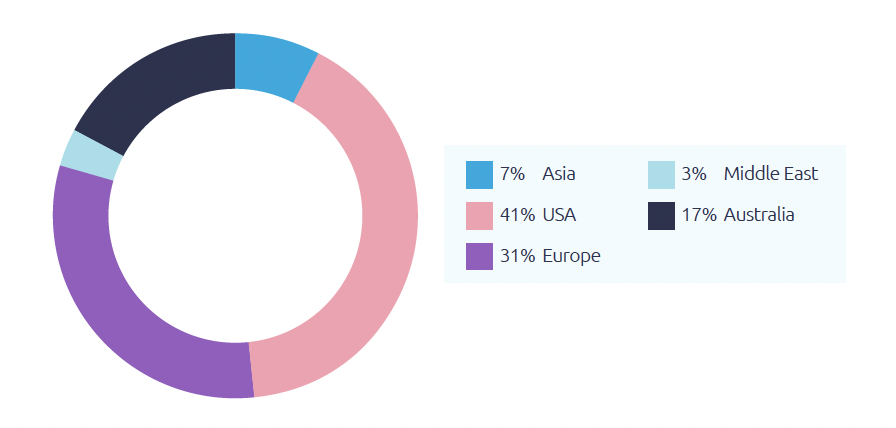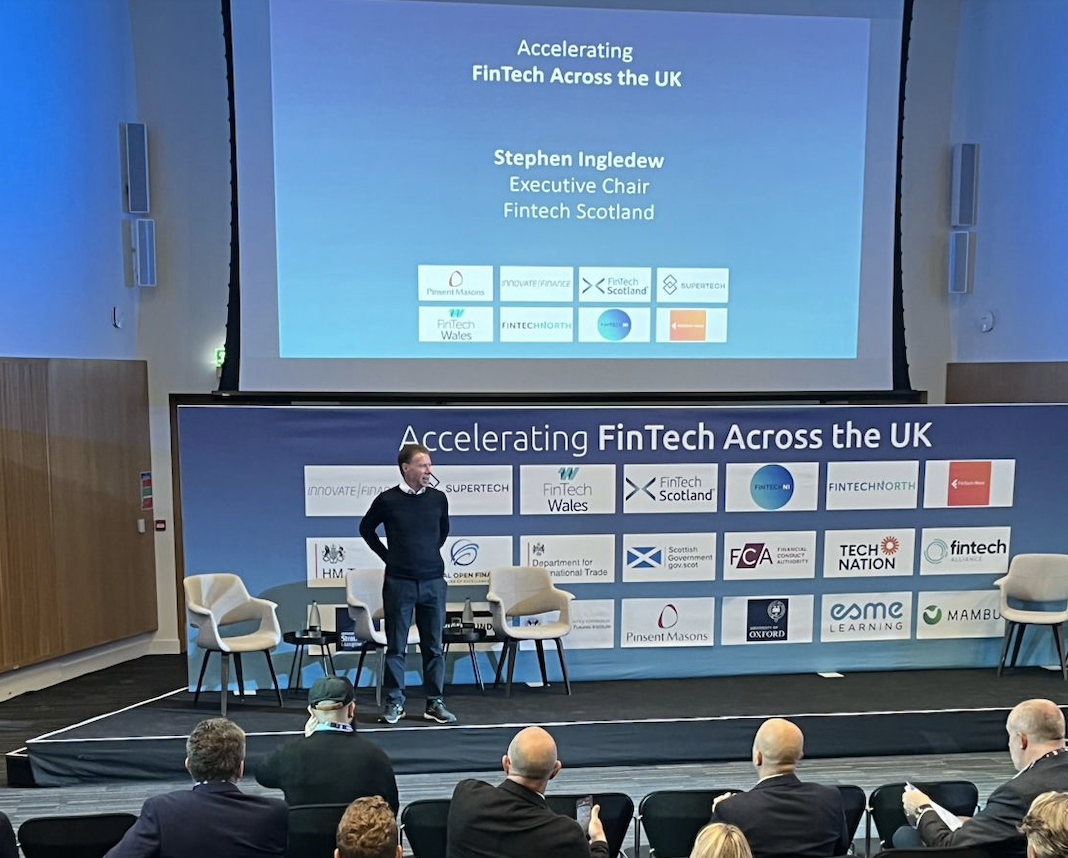Growing International Diversity of Fintech SMEs in Scotland
Fintech has accelerated as a global innovation movement during the pandemic and Scotland is making a positive contribution to this force of change in the digital economy
FinTech Scotland has confirmed that the number of international fintech SMEs in the SME community has grown by over 40% over the past twelve months, complementing the growth of local start-up and growth enterprises.
In recent months companies such as YayPay and Pace AP from the USA, WeFund from Australia and Pulse Market from Ireland have become part of the growing Fintech Scotland community.
The diverse origination of the international SMEs in Scotland’s Fintech community is highlighted by the visual below.

This growing global influence in the Scotland fintech community was a key theme of this year’s Fintech Festival which concluded last Thursday its four-week programme of sixty plus events, innovation meet-ups and conferences.
 The Festival included FinTech Scotland’s collaboration with Scottish Development International and UK Department for International Trade Festival to host events with enterprises in Australian, USA and Asia to highlight inward investment and export opportunities.
The Festival included FinTech Scotland’s collaboration with Scottish Development International and UK Department for International Trade Festival to host events with enterprises in Australian, USA and Asia to highlight inward investment and export opportunities.
The global fintech opportunities was also one of the themes discussed at the Accelerating UK FinTech Conference’ hosted by FinTech Scotland last week, with presentations from Fintech leaders across the UK including Ron Kalifa, Regional bodies and Government Ministers.
FinTech Scotland used the conference to release a “Building a Global Fintech Cluster” prospectus (brochure) to further build on the momentum driving fintech innovation and collaboration.
Commenting, the Executive Chair of Fintech Scotland, Stephen Ingledew said
“The ongoing collaboration of inspiring FinTech leaders will enable us grasp the global innovation opportunities and the UK wide conference in Glasgow was an ideal opportunity to demonstrate this with colleagues and friends from all corners of our country”
Commenting on the FinTech Scotland Festival, CEO of FinTech Scotland Nicola Anderson said,
This year’s festival has reinforced the dynamism, breadth, and capability of fintech innovation in Scotland. We were privileged to be joined by so many fintech and industry leaders sharing experiences, knowledge and opportunities. We’re looking to more collaboration and to supporting the digital and green economy through continued fintech innovation.”
Lessons as the latest IPO window starts to close
In recent weeks, there has been a flurry of news articles about the bumper run of IPOs, observed as economies globally look to plot a post-COVID recovery. Those ongoing and ultra-lax monetary policies buoy this, though that may be coming to an end. Floats are being postponed or prices slashed by prospective issuers, suggesting that it is inevitable that the window is starting to close ”“ for now anyway.
However, is this such a bad thing? Increasingly IPOs have been looking somewhat disorganised. Whilst fervent day one ‘pops’ in the share prices of newly issued stock may be headline-grabbing, ultimately, it suggests that the advisers have miscalled the market. Founders and early-stage investors could have got a far better price had a more considered approach been taken. Indeed, academic thinking from a little over twenty years ago always suggested that involvement in IPOs was a risky proposition. With savings in transaction costs and taxes offset by the fact that the previous investor ought to be selling at the top of the market and the opportunity cost of having capital tied up during the pre-IPO period.
It is also worth bearing in mind that even if IPO deal flow does become somewhat more constrained, the option is not being removed indefinitely. This market has always been cyclical, so that it will return. Given that, what takeaways are there from the frantic levels of activity seen over the last twelve months?
Arguably the most important for many will be ensuring that your cap table reflects the needs of the business at the time of float. What will an IPO mean for key staff and early-stage investors who have likely played an instrumental role in getting you this far? And how can these valuable participants be convinced to stick around for the next phase of the journey?
Secondly, there’s that opportunity to ensure your business is IPO-ready. Regardless of the time horizon here, there’s a raft of best practices that you can deploy to make sure your company is in the right shape to facilitate a listing. After all, you may find that time is of the essence at a future date and such preparedness has longevity ”“ investments now will yield results in the future. That combines to create a situation where you’re getting closer to having liquidity within your privately held business ”“ something that CrowdX is assisting with already, helping bolster the company’s reputation, its brand perception, and the early stages of institutional engagement.
This all means that it should be easier for prospective professional advisers to make more accurate assessments of your company’s value. Those ‘day-one-pops’ in share prices can largely be a simple transfer of wealth from your company to the institutions that can participate at the very outset. Don’t give away wealth unnecessarily.
Scottish fintech Legado partners with MoneyHub
Today, Scottish fintech Legado announced a new partnership with open finance company Moneyhub.
Moneyhub customers will benefit from Legado’s encrypted personal Digital Vault services , enabling them to store their pension, life insurance and mortgage statements and policy documents securely and electronically.
By holding all those documents from different providers in one place, Moneyhub users can get a clearer picture of their financial histories and plan for the future. They will also be able to securely share those documents with selected third parties, such as advisers, friends and family. Each user will receive their own personal, portable and access-controlled vault, with features including after-death sharing and data integrations.
Legado is backed by UK insurer M&G and Edinburgh-based global platform-as-a-service provider FNZ, both part of the FinTech Scotland cluster.
Sam Seaton, CEO of Moneyhub said:
“As an Open Finance and Open Banking leader, Moneyhub truly is a hub for money, offering connections to pension and wealth management accounts, banking, insurance and investment, and more. And one thing all the various account types have in common is paperwork, which is why we have partnered with Legado to offer our clients a market-leading digital vault solution.”
Josif Grace, CEO & Founder of Legado said:
“As two technology leaders focused on helping businesses create exceptional digital experiences and consumers better prepare for the future, this partnership made a lot of sense. We are delighted to be working with the team at MoneyHub to create a world-class proposition.”
